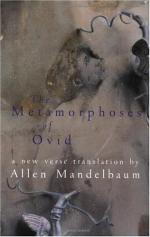|
|
Metamorphoses Topic Tracking: Revenge
Book 1: The Ages of Mankind
Revenge 1: Revenge is a common theme throughout Metamorphoses because it's usually the motivation for whatever transformation the stories are explaining. The gods are constantly avenging themselves and changing mortals into birds or beasts to prove their superiority. The first instance of a revenge transformation is when Jove turns Lycaon into a wolf as a punishment because he was skeptical that Jove was a god.
Book 1: Io
Revenge 2: Juno gets revenge against Io even though Jove raped the girl. Juno is a jealous goddess who takes much of her anger out on the mortal women her husband rapes. She can't reproach Jove because he is the chief god, so she gets her revenge against those in whom he's interested.
Book 2: Mercury and Battus
Revenge 3: Mercury tested Battus' word, and then when Battus didn't keep his promise, Mercury zapped him. The odd thing is that Mercury seemed to enjoy his revenge against Battus. By testing the man's promise, it's almost as if he were hoping that Battus would break his word.
Book 2: The Envy of Aglauros
Revenge 4: Athene bided her time to get Aglauros back for breaking her promise to the goddess. Rather than immediately turning the girl into a bird or beast, Athene let Aglauros' cunning put her in the perfect position for Athene to get revenge. Athene didn't even have to do the dirty work. She sent Envy to infect the girl and then Mercury is the one who changed Aglauros to stone. Athene's revenge was very calculated.
Book 3: Diana and Actaeon
Revenge 5: Diana's revenge here is ironic and particularly brutal. Whether or not Actaeon saw her naked, changing him to a deer and having him ripped to pieces by his own hounds seems to be an excessive punishment. Diana does that a great deal. She is not a very forgiving or compassionate goddess. Bacchus avenges himself in a similar manner with Pentheus later in Book 3.
Book 6: Arachne, Niobe, The Lycian Peasants, and Marsyas
Revenge 6: In each of these stories, mortals either challenged or offended the gods. As punishment for their insurrection, each of the bold mortals was transformed from their human shape.
Book 6: Pelops
Revenge 7: Tantalus' punishment is one of the well-known stories of the Underworld and a fitting consequence of his crime. The story is also the origin of the word "tantalize".
Book 9: The Death and Apotheosis of Hercules
Revenge 8: Nessus had his revenge on Hercules because he had tricked Deianira into believing that the poisoned shirt was a talisman for love. The shirt destroyed Hercules' flesh, but the centaur's revenge wasn't total because Hercules was made immortal.
Book 9: The Birth of Hercules
Revenge 9: Juno bribed the goddess of childbirth to prevent Alcmena from delivering her baby, Hercules. Juno was jealous because Jove was the baby's father, and so she wanted to make it as difficult as possible for Alcmena. Ironically, Alcmena's servant, Galanthis, tricked the birth goddess, and Alcmena delivered the child. In retribution for the servant's deception, the birth goddess turned Galanthis into a weasel.
Book 14: Scylla and Glaucus
Revenge 10: Although Scylla scorned Glaucus because she didn't think him handsome, he still loved her and wanted her to love him. Unfortunately, he made Circe mad because he rejected her for Scylla, and so Circe turned Scylla into a sea-monster. She got vengeance against them both at the same time.




